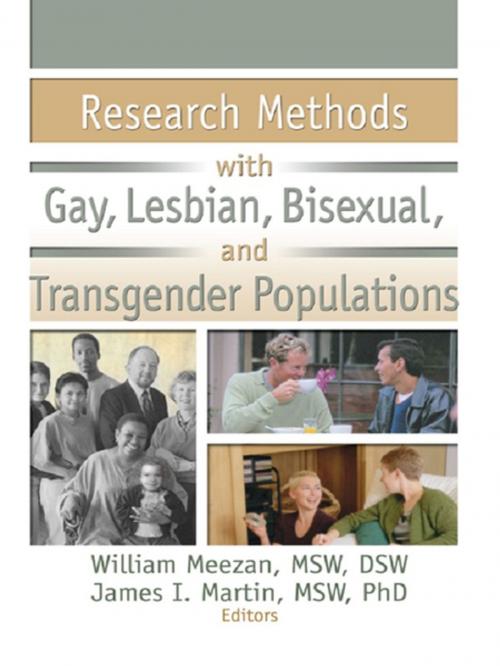Research Methods with Gay, Lesbian, Bisexual, and Transgender Populations
Nonfiction, Social & Cultural Studies, Social Science, Social Work, Gender Studies, Gay Studies| Author: | William Meezan, James I. Martin | ISBN: | 9781136570193 |
| Publisher: | Taylor and Francis | Publication: | December 6, 2012 |
| Imprint: | Routledge | Language: | English |
| Author: | William Meezan, James I. Martin |
| ISBN: | 9781136570193 |
| Publisher: | Taylor and Francis |
| Publication: | December 6, 2012 |
| Imprint: | Routledge |
| Language: | English |
Take an in-depth look at what works-and what doesn't-in research with GLBT populations!
This essential book examines the usefulness of current frameworks for research with GLBT populations and highlights the necessity for greater complexity in the conceptualization and design of research with these populations. It will help you understand the need for more inclusive and representative samples and the need to protect the privacy of GLBT research participants-and ways to accomplish these goals. In addition, Research Methods with Gay, Lesbian, Bisexual, and Transgender Populations considers the advantages and limitations of having an inside perspective when conducting research with these populations. It also explores the myriad ways in which this research can be used to better understand issues facing GLBT communities.
Specifically, Research Methods with Gay, Lesbian, Bisexual, and Transgender Populations discusses:
- eight strategies that outsiders can use to overcome barriers to doing their work
- the challenges of finding and studying older members of gay and lesbian communities
- the special challenges that studying gay drug users pose to the researcher
- factors affecting research with urban Black and African-American GLBT populations
- sampling issues, including ways to overcome the challenges of conducting research with sexual minority adolescents, issues related to dealing with institutional review boards, and lessons derived from empirical articles in the Journal of Gay & Lesbian Social Services
- unique features of AIDS service organizations to consider when developing an evaluation strategy
- ethical standards for research and evaluation with GLBT populations
- and a great deal more!
From the Foreword, by Anthony R. D'Augelli:
*In social science research, the effort to extract durable principles of social causality from the apparent randomness of everyday life requires the construction of reliable, if tentative, knowledge that is significantly more informative than mere speculation. With our ever-increasing knowledge base, increasingly sophisticated and powerful quantitative and qualitative methodologies, and with an ever-expanding cadre of researchers, our ability to discern patterns of development of GLBT people from birth to death, the unique qualities of their relationships, and the impact of communities and cultures on the ways in which their sexualities are manifested, will come into sharper focus. In this way, research becomes a tool by which GLBT people transcend invisibility and marginalization. As new research accumulates, the unique contributions that GLBT lives make to our understanding of the nature of human development will be documented in ways never before thought possible.
Within the larger context of social science research on GLBT populations, this book describes the current status of social service researchers in their quest for methodological sophistication and conceptual complexity. The work of the contributors to this volume exemplifies the progress that has been made since the first research reports on this topic were published.*
Take an in-depth look at what works-and what doesn't-in research with GLBT populations!
This essential book examines the usefulness of current frameworks for research with GLBT populations and highlights the necessity for greater complexity in the conceptualization and design of research with these populations. It will help you understand the need for more inclusive and representative samples and the need to protect the privacy of GLBT research participants-and ways to accomplish these goals. In addition, Research Methods with Gay, Lesbian, Bisexual, and Transgender Populations considers the advantages and limitations of having an inside perspective when conducting research with these populations. It also explores the myriad ways in which this research can be used to better understand issues facing GLBT communities.
Specifically, Research Methods with Gay, Lesbian, Bisexual, and Transgender Populations discusses:
- eight strategies that outsiders can use to overcome barriers to doing their work
- the challenges of finding and studying older members of gay and lesbian communities
- the special challenges that studying gay drug users pose to the researcher
- factors affecting research with urban Black and African-American GLBT populations
- sampling issues, including ways to overcome the challenges of conducting research with sexual minority adolescents, issues related to dealing with institutional review boards, and lessons derived from empirical articles in the Journal of Gay & Lesbian Social Services
- unique features of AIDS service organizations to consider when developing an evaluation strategy
- ethical standards for research and evaluation with GLBT populations
- and a great deal more!
From the Foreword, by Anthony R. D'Augelli:
*In social science research, the effort to extract durable principles of social causality from the apparent randomness of everyday life requires the construction of reliable, if tentative, knowledge that is significantly more informative than mere speculation. With our ever-increasing knowledge base, increasingly sophisticated and powerful quantitative and qualitative methodologies, and with an ever-expanding cadre of researchers, our ability to discern patterns of development of GLBT people from birth to death, the unique qualities of their relationships, and the impact of communities and cultures on the ways in which their sexualities are manifested, will come into sharper focus. In this way, research becomes a tool by which GLBT people transcend invisibility and marginalization. As new research accumulates, the unique contributions that GLBT lives make to our understanding of the nature of human development will be documented in ways never before thought possible.
Within the larger context of social science research on GLBT populations, this book describes the current status of social service researchers in their quest for methodological sophistication and conceptual complexity. The work of the contributors to this volume exemplifies the progress that has been made since the first research reports on this topic were published.*















